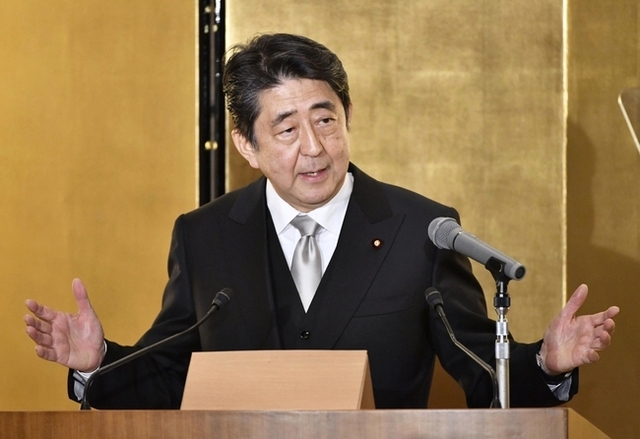Posted on : Jan.7,2019 17:46 KST
Modified on : Jan.7,2019 18:01 KST
 |
|
Japanese Prime Minister Shinzo Abe holds a press conference at Ise Grand Shrine in Japan’s Mie Prefecture on Jan. 4. (Yonhap News)
|
The dispute between South Korea and Japan is being aggravated by a Japanese patrol plane’s close approach to a South Korean naval vessel and by the issue of compensation for Korean victims of forced labor during the Japanese colonial occupation. After South Korea’s Ministry of National Defense (MND) posted a video explaining the patrol plane incident, the Japanese Maritime Self-Defense Force issued a rebuttal that may make the dispute escalate into a brawl between Korean and Japanese netizens.
Furthermore, the Japanese government is protesting a request filed by the victims of forced labor for a Japanese company’s South Korean assets to be seized in lieu of compensation and appears to be preparing to take the issue to an international court. This situation can’t be seen as desirable in consideration of the future of South Korea-Japan relations.
It’s difficult to say that the precise facts of the Japanese patrol plane incident have been sufficiently established. Japan has been demanding an apology, insisting that the South Korean destroyer used its fire-control radar on a Japanese maritime patrol aircraft during the rescue of a wrecked North Korean fishing boat. The South Korean government has countered by insisting the radar in question was not operated at the time and criticizing the Japanese P1 maritime patrol aircraft for its threatening low-altitude flyby.
Whatever the circumstances, it seems clear that the reasons for things escalating as they have stems mostly from Tokyo’s early overreaction. In that sense, it was right for Seoul to respond by posting a video explaining the situation. What can’t be seen as the right direction is for this kind of “battle of the facts” to escalate into a war of internet comments as masses of internet users chime in on either side. The South Korean and Japanese governments will need to discuss matters calmly, with a focus on figuring out the actual facts.
It is also unfortunate for the Japanese government to respond so vehemently to forced labor survivors’ application to seize assets from the Japanese company Nippon Steel and Sumitomo Metal, or to try to make it into an international dispute. On Jan. 6, Prime Minister Shinzo Abe voiced “serious dismay” with the survivors’ application, adding that he had “ordered the examination of responses measures based on international law.” With other survivors showing signs of pursuing compulsory execution procedures against Mitsubishi, the diplomatic conflict between the two sides appears likely to intensify.
To date, the Japanese government has maintained that the issue of compensation for forced labor conscription was conclusively resolved by the two sides’ 1965 Claims Settlement Agreement. Abe repeated the same argument on Jan. 6. But the fact that individual rights to claim damages were not extinguished with that agreement is something even the director of the treaty bureau in Japan’s own Foreign Ministry confirmed in 1991. In refusing to recognize this fact and in trying to deflect it by turning the compensation issue into a matter of international public opinion, Tokyo cannot be seen as acting properly.
The Japanese government should particularly note the claims that Abe is deliberately playing up diplomatic issues as a way of eliciting support from his conservative base at home.
The patrol plane conflict and compensation issue are matters that should be resolved calmly and reasonably. It does neither side any good for diplomatic matters like these to escalate into something that harms bilateral relations. While differences may be expressed in the resolution of these issues, we can’t afford to let disagreements like those undermine the foundation of South Korea-Japan ties. Hopefully both sides will keep their emotions in check and exercise wisdom in discussing things reasonably and coming to an amicable resolution on the issues at hand.
Please direct comments or questions to [english@hani.co.kr]






